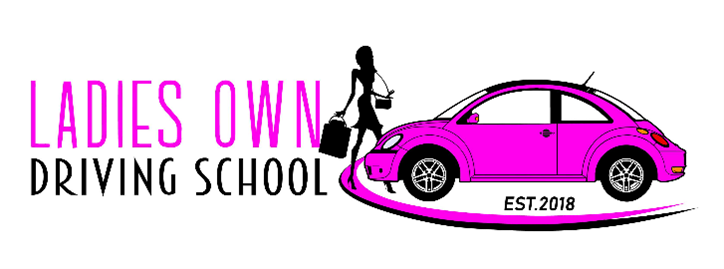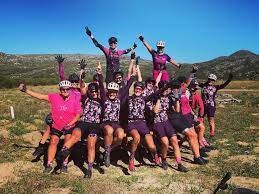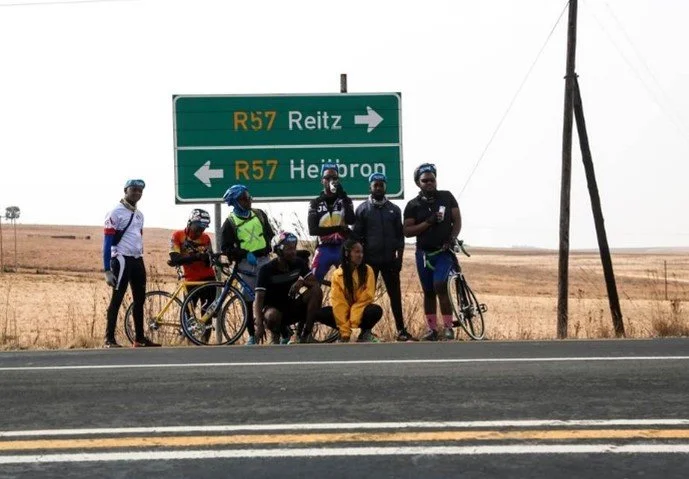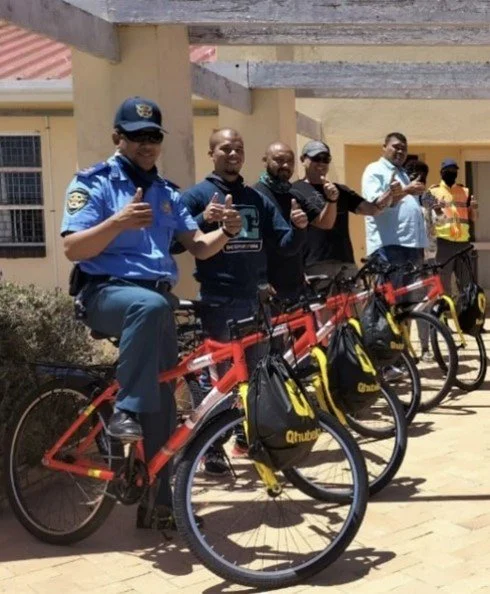Transport Activism in South Africa and Beyond
Rachel Chiverton
Rachel Chiverton is a third-year history student at the University of Birmingham. Inspired by this research, which she completed during the first year of her degree, she has since become more engaged in supporting the rights of cycle users and in increasing women’s safety while using public transport.
As the second largest continent by landmass and population, Africa faces a vast range of social, political, and economic issues threatening social mobility and equality. Such disparities are the result of centuries of slave trade exploitation, reinforced by decades of colonial and neocolonial oppression. As noted by economist Nathan Nunn “the African countries that are the poorest today are the ones from which the most slaves were taken.” To this day, then, some African economies have not stabilised following forced mass migration and social displacement. Racial capitalism, in conjunction with neocolonialism, has created unequal world production systems and left African economies vulnerable for the foreseeable future.
Faced with this reality, activists and innovators across the continent are leveraging transport solutions to help improve people’s lives, notably where impoverished communities are often neglected by infrastructure to support accessible and varied transport methods. Investment in transport has proven to advance many issues, including access to healthcare, combating congestion in cities, and improving freedom for economically marginalised groups. Many successful innovations have brought about improvements that are economically efficient and environmentally sustainable, producing astounding results and exemplifying new mobility initiatives to governments across the continent. The ingenuity and enthusiasm of this diversity of transport initiatives may be attributed to the young population of Africa who are driven to improve their own lives and their futures through mobility.
The volume and creativity of transport activism can be demonstrated by examining specific nations. South Africa has utilised transport to promote social mobility and equality. While formidable structures of inequality endure in post-apartheid South African society, an array of groups are engaged in transport activism in service of deepening democracy.
Mobilising for Women’s Rights on Public Transport
Feeling safe on public transport is a patriarchal privilege and many women can attest that using a taxi alone is a last resort. Ladies Own Transport looks to create a safer environment ensuring women have the same options of public transport, including having a safe environment to learn how to drive. Between January and March 2023, the South African Police Service reported public transport and taxis were the third most common setting for reported sexual assault and rape. The founder of Ladies Own Transport, Joanie Fredricks, acknowledged the major risk to safety for women travelling on these modes of transport and now provides for-female, by-female alternatives including female driven taxis and women driving instructors. In addition to providing an individualised and safe experience, Ladies Own Transport also contributes to alleviating transportation poverty by providing their services at a significantly lower cost than traditional taxis.
Image credit: Facebook
The driving school is located in Mitchells Plain, a previously racially segregated area created by the government in 1970. Female residents are now supported by Ladies Own Transport to use taxis and learn to drive, an opportunity denied from the area during apartheid. Joanie Fredricks often takes to Facebook to celebrate her students and empower others to learn to drive for their own safety and independence. South Africa has a long-standing issue of male violence towards women. A Medical Research Council survey found “40% of men have hit their partner and one in four men have raped a woman,” - the ability to drive can therefore be life-saving service when fleeing an abusive relationship. Ladies Own Transport is a simple concept bridging economic, political, and social divides. This organisation has clearly highlighted not only the importance of safe transport access, but also some of the significant issues facing South Africa such as the levels of abuse towards women.
Breaking the Mould with Mobility Activism
In South Africa "A woman is killed every four hours". Statistics such as this deter women from participating in solo recreational activities in rural areas due to a lack of safety. For women to simply accept such restrictions would ensure they never change. Groups such as Trail Angels are diversifying women’s sports while also providing women the opportunity to partake in outdoor activities with safety in numbers. This is a mountain biking organisation in South Africa driven by female empowerment, offering a safe space for women to be independent and break into a male-dominated activity. Due to threats like sexual assault and kidnapping, women are rarely able to engage in independent outdoor activities like mountain biking. This is particularly true given that outdoor settings were the second most common setting for sexual assault and rape reported to the police in 2022-2023. The South African group started with 6 members in 2012 and now has over 450 with numbers continually growing due to accessible group rides at all levels and support for beginners. In addition, such regular group activity provides a support network that monitors women’s attendance and raises alarm bells if classes are missed. The group encourages safety and inclusion, even designing their own cycling clothes to ensure women feel comfortable while riding. For many of these women, mountain biking would have seemed dangerous and inaccessible, but Trail Angels proved that once the barriers such as female vulnerability are broken, the sport can be enjoyable and liberating.
Cycling as Education
South Africa is a country scarred by the ongoing impact of apartheid, and activists are using transport to develop a more equal society. Apartheid brought in many measures that ended cycling in most major cities, notes historian and mobilities scholar Njogu Morgan. The founder of Bicycle Stokvel experienced the violence of apartheid and recalls how, when the formal segregation had ended, bicycles gave him and his friends freedom to move about their hometown of Vosloorus freely. His aim was to “start a collective that uses bicycles to cross the physical and social boundaries created by apartheid” and open up areas that were manufactured to benefit white residents. The group rides are free, provide free bikes and educate residents on the history of Vosloorus as displayed in the local murals and art. Guided biking tours and community art projects promote a greater understanding of the history and lasting effects of segregation. The work of Bicycle Stokvel and Ladies Own Transport not only reclaim the right to mobility, but also use it to promote equality accompanied by education and activism.
Bicycle Stokvel. Photo by Kelebogile Mokonyane
Wheels of Change: Empowering Communities with Affordable Bikes
At one time a status symbol, transport technologies have shifted from creating class lines to diminishing them through activism. South Africa’s popularisation of cycling and transition away from motorised, often economically inaccessible, transport has enhanced the lives of many individuals living in areas impoverished by oppressive systems implemented during the apartheid era and still in effect today. Cycling has become the freedom that individuals like Konupi (founder of Bicycle Stokvel) strived for in a political and economic sense, bicycles are accessible and are therefore defeating the status symbol of motorised vehicles. The diversity of transport initiatives in South Africa is astounding and groundbreaking. Many of these organisations are charities or non-profit, proving that activism and the initiative of members of the community can deliver the most simple and cost-effective solutions. The work of these organisations is saving and transforming lives and forming pioneering schemes in social mobility.
Bicycle Empowerment Network (BEN) upcycles donated bicycles, providing a safe and efficient mode of transport to struggling communities. Their workshops and Cycling Empowerment Centres provide jobs and economic stability to the local area. BEN is not only economically and socially beneficial, but also environmentally sustainable. Upcycling bicycles reduces waste to landfill and ensures more people are using emission-free transportation, reducing pollution. The efficiency of their organisation is obvious in the volume of their work distributing over 31,000 cycles and providing training in road safety to over 10,000 people. BEN don’t simply provide transport but also deliver lifestyle and cycling courses and support the rights of cyclists. They use activism to boost the profile of cyclists on the road and ensure that they have the same access as motorised road users. The work of Bicycling Empower Movement is revolutionary in providing transport to areas that were previously restricted by economic disparities and lack of infrastructure. BEN is a service that could have a global impact, easing congestion, reducing emissions and expanding transportation options.
Cycles for Solutions: How Transport Activism Affects Rural and Urban Settings
The continent of Africa harbours extreme disparity in the social, economic and geographical make up of varying regions. The issues facing deprived rural towns and developing urban cities are drastically different, but the solutions are shockingly similar. Cycling is proving to be a cost efficient, socially beneficial and environmentally friendly remedy to issues faced by extremely rural towns and densely populated cities.
Last Mile Health was founded in 2007 to bring healthcare to the most rural parts of Africa using bicycles and motorcycles. 1.2 million people in Liberia now have access to mobile healthcare, and for many other regions travelling medical aid proved to be an essential resource in preventing the spread of HIV, Ebola and Covid-19. Maintaining the health of Africa’s extremely young population is essential to protecting the economy and whole villages now having access to simple provisions has been transformative. Healthcare is an issue for many governments globally, and Last Mile Health has proven a vast number of issues can be rectified with improved transport.
In contrast to the challenges faced by rural communities, the youth of Lagos are utilising cycling to tackle the congestion crisis crippling the city. “Lagosians collectively lose 3 billion hours to traffic congestions yearly, and that if that time were reduced by 20 per cent, it would save the state at least $1 billion”. Cycology was founded in 2011 to promote cycling and ease congestion, but it also holds events such as “Independency Day Ride”, celebrating the country of Nigeria and the desire to resolve the congestion crisis, unlocking the cities full potential. Cycology makes it evident that residents of Lagos wish to end the long-lasting issue of congestion by decreasing car usage, not by continuing expensive and environmentally detrimental expansion of roads. It’s environmentally responsible and economically self- sufficient initiatives like these that are the future of social mobility.
The progress made by advancing transport is revolutionary and governments across the world should look upon the work of mobility groups who are transforming their towns and cities. In Africa the continent's vastness and young population means that many are intent on taking issues into their own hands with creativity and innovation, creating a mobile revolution.




